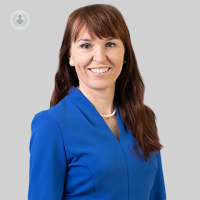Heart failure and breathlessness: what is the link?
Written in association with:Breathlessness is a frequently occurring symptom of heart failure, which can often lead to patients experiencing panic and stress. Distinguished consultant cardiologist Dr Gosia Wamil explores the relationship between breathlessness and heart failure.

What is the relationship between heart failure and breathlessness?
The relationship between heart failure and breathlessness is profound. Heart failure is a condition where the heart struggles to pump blood effectively, leading to a buildup of fluid in the circulatory system. This accumulation of fluid, particularly in the lungs, results in breathlessness, or dyspnea. Breathlessness is a common and distressing symptom of heart failure.
What are the different types of breathlessness associated with heart failure?
People with heart failure experience different types of breathlessness. Exertional dyspnea is one form, occurring when individuals become breathless during physical activity. Climbing stairs or walking can trigger this breathlessness.
Paroxysmal nocturnal dyspnea (PND) is another type of breathlessness associated with heart failure. It is a sudden and severe episode of breathlessness that jolts a person from sleep, typically a few hours after they've gone to bed.
Orthopnea is the third type of breathlessness, and is characterised by difficulty breathing while lying flat. Those with heart failure often find relief from this symptom by propping themselves up with pillows or sitting upright.
How can breathlessness be managed or prevented in people with heart failure?
To manage and prevent breathlessness in people with heart failure, cardiologists use a combination of approaches. Medications such as diuretics work to reduce fluid build-up, while ACE inhibitors and beta-blockers improve heart function.
Lifestyle changes, such as following a low-sodium diet and maintaining a healthy weight, can decrease fluid retention. Furthermore, exercise, as recommended by doctors, plays a crucial role in improving heart function and reducing breathlessness.
In some cases, supplemental oxygen therapy is recommended, as well as positional changes. For example, elevating the head of the bed or using extra pillows, can help to alleviate symptoms.
What are the signs and symptoms that suggest that breathlessness in a person with heart failure is getting worse?
The following signs and symptoms demonstrate that breathlessness is worsening in individuals with heart failure;
- Sudden, severe shortness of breath, particularly at night (PND).
- Increased difficulty breathing during physical activities.
- Swelling in the legs, ankles, or feet.
- Rapid weight gain due to fluid retention.
- Worsening fatigue.
- Increase in coughing, especially if the cough produces pink, frothy sputum.
What are the long-term implications of breathlessness in people with heart failure?
The long-term implications of breathlessness in individuals with heart failure can be significant, affecting their quality of life, physical activity levels, and leading to frequent hospitalisations if the condition is not properly managed. In severe cases, chronic breathlessness can contribute to a decline in health and a poor prognosis.
What are the latest research developments in the management of breathlessness in people with heart failure?
There are new classes of medicines used for the management of heart failure: SGLT2 inhibitors. These drugs were initially developed for patients with diabetes but they have now been repurposed for the management of patients with heart failure. We still do not fully understand how they work, however, it is certain that they have mild diuretic function and help to improve breathlessness in patients with different types of heart failure.
If you are suffering from breathlessness with heart failure and would like to book a consultation with Dr Wamil, do not hesitate to do so by visiting her Top Doctors profile today.


